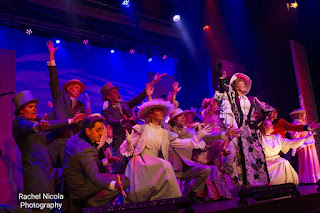My Brilliant Friend at the Olivier Theatre – National Theatre | Review

Some stories cannot be told in a single sitting. Think Harry Potter. The last book was made into two films and the ‘The Cursed Child’ is two plays. The reason I’m mentioning this is because after seeing My Brilliant Friend Parts 1 and 2, at the National Theatre, it struck me that making one book into two plays is hard enough but April De Angelis must have really had their work cut out in converting the four books in Elena Ferrante’s ‘Neapolitan Novels’ into two individual shows.
My Brilliant Friend concerns the friendship of two ladies. When we first meet them Lenù Greco (Niamh Cusack) and Lila Cerullo (Catherine McCormack) are 8-years-old and living in a run-down area of Naples where poverty and small-time crime families are the name of the game. They bond over an incident where they swap dolls and then toss them through a grille into a cellar belonging to the local loan shark. Somehow, this starts a friendship that lasts over fifty years. Not to say that their friendship doesn’t have its ups and downs. The two are intellectually compatible – in fact Lila is slightly more advanced than Lenù – but, due to their parents differing attitudes towards educating women, as demonstrated by Lila’s father Fernando (Martin Hyder) beating his daughter and throwing her through a window for thinking she could carry on her education. Despite their parting of the ways, Lenùto into further education and Lila working in her father’s cobblers where any chance of self-improvement was beaten out of the children by a father who states “we don’t make shoes, only mend them” the two manage to maintain their friendship, albeit changing continually as the years go by. By the end, and despite both of them having a dalliance with philosopher and smug academic Nino (Ben Turner) who says, and probably semi-believes, all the right things about women’s emancipation but only if it doesn’t negatively affect his own life. By the end, both women have children, failed marriages, children and careers. Lenù a successful writer and Lila something big in computers. Their lives have certainly been eventful, but have they been happy and fulfilling? Well, that’s for others to decide.
April De Angelis uses each act to bring the four books – “My Brilliant Friend”, “The Story of a New Name”, “Those Who Leave and Those Who Stay” and “The Story of the Lost Child” to life. And there is a heck of a lot in each one. As a taster, we had, child beating, wedding night rape, wife beating, gangland killing, cross dressing, gay sex, adultery, theft, and even an earthquake. The sheer amount of action meant that there were some pretty short, punchy scenes and, to my mind, really reminded me of a television soap opera and there were moments where I was almost expecting to hear the iconic “doof doof” music – think ‘Eastenders’ with Italian names, but strangely not Italian accents. However, despite all these high-octane action moments, there were times when the story really seemed to lose momentum and just amble a bit too gently across the stage and I found my attention wandering a bit.
The production itself was well put together and both Niamh Cusack and Catherine McCormack – reprising their roles from the original Rose Theatre production – were superb, and the two characters had a wonderful doggedness about them that shone through the many traumas they had to endure. The two of them and the rest of the twenty-four strong cast, really inhabited both Naples and Florence with a wide range of individual characters who really looked the point as they moved through the decades in Designer Soutra Gilmour’s costumes. Director Melly Still uses the vast stage and Soutra’s flexible set – a series of moveable concrete stairs – along with Tal Yarden’s back-projected videos, to great effect creating interesting locations and homes for the characters. One other thing to mention about the production is the soundtrack. Whilst it was not always easy to keep track of the year in which events were occurring, the highly impressive choice of music really gave the audience a great insight into the time covered. In fact, if they felt the urge to release a ‘Now that’s What I call My Brilliant Friend” album, I would definitely be in the queue to buy a copy.
Overall, whilst there were a lot of very good points to My Brilliant Friend from a production and acting perspective, I’m afraid I didn’t really connect that much with the characters. The two main characters never seemed to recover from the ideas that they were brought up with. There was a moment when Lenù, now a successful author, was punched by her husband. Instead of reacting as you would expect from a woman who had recently had a book about female emancipation praised to high heaven, she seemed to just accept the hit as being okay. There were other things like this, where I really felt neither woman had, despite their outward appearances, had grown and changed. Unfortunately, that wasn’t how I felt and by the end, my interest in where they were going next had pretty much waned. As the lights went down, I realised that, unlike so many plays, I wasn’t worried about what happened next, and that is not a good thing.
Review by Terry Eastham for London Theatre 1

Comments
Post a Comment